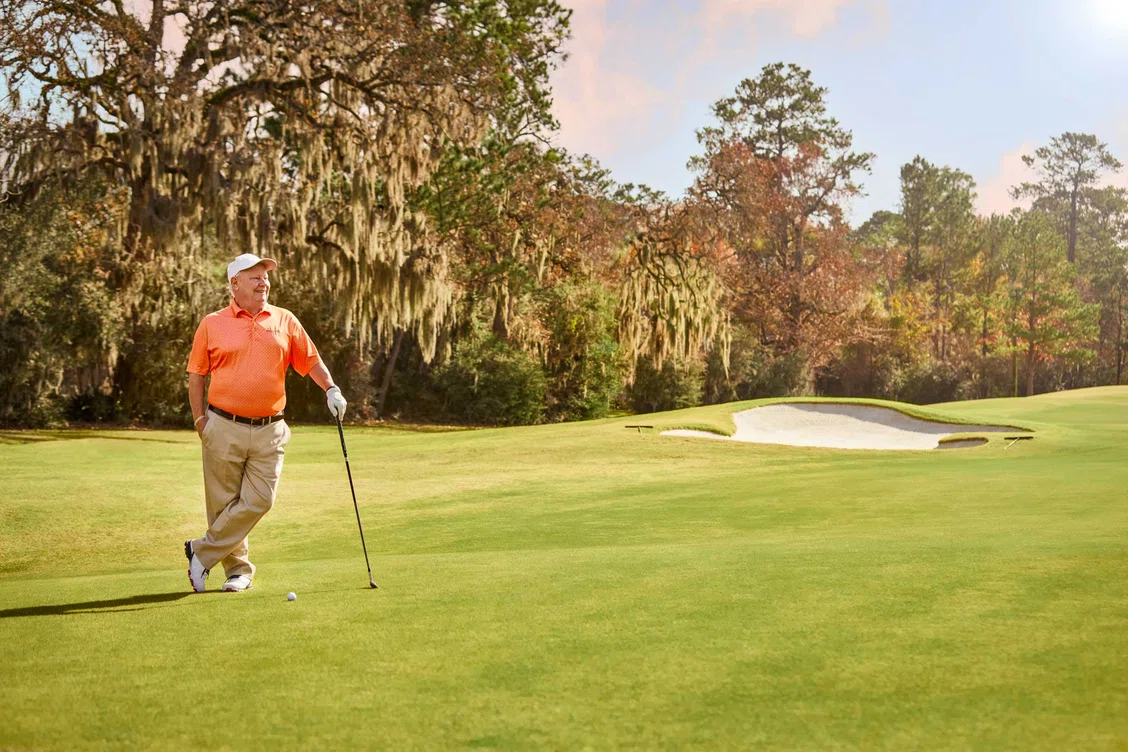result




Translational Research
Taking a Swing at ALS

Researchers appreciate the generosity of Bill Sumner, shown here on the 15th hole of The Jackrabbit Course at Champions Golf Club
Bill Sumner aims to find cure for neurodegenerative disease
Bill and Sharon Sumner loved the outdoors. They enjoyed sports, such as golf and tennis. They traveled the world together. They did what few couples have done: fished catch-and-release for the Mongolian taimen in support of conservation efforts. But in 2012, their lives changed forever.
After 10 months of mysterious symptoms and unanswered questions, Sharon was diagnosed with amyotrophic lateral sclerosis (ALS) at the Houston Methodist Neurological Institute. Upon voraciously reading about ALS, Bill learned the average lifespan after diagnosis was 30 months.
Neurologist Dr. Ericka P. Greene, who treated Sharon and today holds The Sumner Family Distinguished Chair in Neuromuscular Research, disagreed. “Don’t pay attention to that,” she told them. “We are going to fight with all we have.”
Sharon battled the disease for five years before passing away. Ever since her diagnosis, Bill has been determined to help find a cure for this debilitating, fatal disease. In 2022, he made a gift to Houston Methodist to establish the chair now held by Dr. Greene.
ALS is a progressive neurodegenerative disorder that affects the nerves of the brain and spinal cord, particularly the neurons that control movement. The disease is devastating because people with ALS can often still perform higher mental processes, like remembering and understanding. They are aware of their loss of motor function, becoming trapped inside their own bodies.
Over time, favorite activities and sports are not feasible. Eventually, walking, speaking and eating become difficult and then impossible.
The physician-scientists at Houston Methodist, long led by renowned neurologist Dr. Stanley H. Appel, the Peggy and Gary Edwards Distinguished Chair in ALS Research, are developing new means to diagnose, treat and ultimately cure ALS. They are searching for drugs to slow ALS progression, restore years to patients’ lives and reduce pain.
Dr. Appel and Dr. Jason R. Thonhoff, assistant professor of neurology, have focused their ALS research on an immune cell known as a Treg or regulatory T cell. Tregs normally help suppress excessive inflammation in the body. In certain circumstances, Tregs lose this ability, which can leave inflammation unchecked and accelerate ALS progression.
Drs. Appel and Thonhoff have developed a new approach to treat ALS patients. They collect Tregs from the patient and grow them outside the body to help the cells restore normal anti-inflammatory properties. Then, they infuse the Tregs back into the patient.
The physician-scientists are now conducting a phase 2 clinical trial. Initial results from eight patients show exciting promise — the treatment slowed or halted disease progression in six patients. There also were no deleterious effects after one year with regular Treg infusions. A larger study is the next step.
“Research efforts could give a person an extra 10 to 15 years of life,” says Bill. “By then, there’s no telling — we may find a cure!”
A longtime philanthropist, Bill became knowledgeable about ALS after his late wife’s diagnosis. Research toward a cure is now a priority for him. “If you are going to give to a cause, choose one you are passionate about,” advises Bill. “Give what you can, no matter the size, because every dollar counts.”
Discover More

